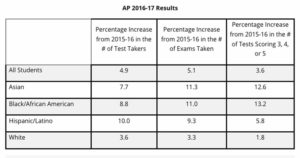
Report by Paula Antolini
September 29, 2017 9:46AM EDT
Connecticut Students Enrolling in Advanced Placement Courses at Significant Pace
September 28, 2017
Students took over 53,000 AP exams in 2017, an Increase of 4.9 Percent
(HARTFORD, CT) – Governor Dannel P. Malloy and State Department of Education Commissioner Dianna R. Wentzell today announced that Connecticut public school students have significantly increased their participation and performance on Advanced Placement (AP) exams, according to results published today by the College Board. The number of students who took at least one AP exam in 2016-17 rose to 28,961, an increase of 4.9 percent from 2015-16. Those students took 53,106 exams, an increase of 5.1 percent from the prior year. Of the exams taken, 36,404 exams achieved a score of three, four, or five, also an increase of 3.6 percent from 2015-16. These improvements were evidenced among students from all racial/ethnic backgrounds.
“With graduation rates on the rise and more students demonstrating success on college-level material, Connecticut students continue to overcome challenges and be successful,” Governor Malloy said. “We’re also pleased to see that the opportunity gap continues to close with more traditionally under-represented students participating in AP classes. And it underscores the necessity for us to continue to provide vital financial resources to the school districts with the greatest need. The fact is, today’s global economy demands more of all our students than it did of previous generations. Their achievement in college or post-secondary programs is critical to our collective future success – and experiencing rigorous material in high school helps prepare them to meet that challenge.”
“Improving test scores are important academic barometers, but rising participation levels are equally significant and point to ongoing progress in strengthening our education system for all students,” Lt. Governor Nancy Wyman said. “I want to thank Connecticut’s teachers and administrators for their commitment to our students and for inspiring them to challenge themselves, and I congratulate our students for their hard work and success.”
To improve access and remove barriers for under-represented student populations the Connecticut State Department of Education (CSDE) for the fourth year in a row paid the remainder of fees not covered by the College Board and the U.S. Department of Education for low-income students to take AP exams in spring of 2017. CSDE will continue to cover this cost.
“It is heartening to see that Connecticut’s educators and counselors are responding to our call through the Connecticut’s Next Generation Accountability System and encouraging greater participation in demanding coursework like AP,” Commissioner Wentzell said. “Delivering on our promise to prepare all of our students to succeed in college and careers means setting higher expectations for what they should know and be able to do. Access to college-level material, like AP courses, and access to college-entrance exams are important pieces to expanding their opportunities for successful futures. We commend our students and educators on the improvements they’ve made this year and we are committed to supporting continued success as they gain further experience with more rigorous instruction.”
Based on the results of the fall 2016 PSAT exams, CSDE sent letters to over 20,000 students identified as having AP potential. CSDE will continue this practice as well.
The Next Generation Accountability System acknowledges that students may demonstrate their abilities through options other than the AP, which is why the system recognizes participation in International Baccalaureate (IB), dual enrollment, and career/technical education courses, in addition to exam performance on the IB, SAT, and ACT.
Click image velow for AP 2016-17 Results:
###



Leave a Reply